2023年外研版中考英语一轮复习 第九节 八年级下册 Module 1 ~ Module 2课件(共55张PPT)
文档属性
| 名称 | 2023年外研版中考英语一轮复习 第九节 八年级下册 Module 1 ~ Module 2课件(共55张PPT) | 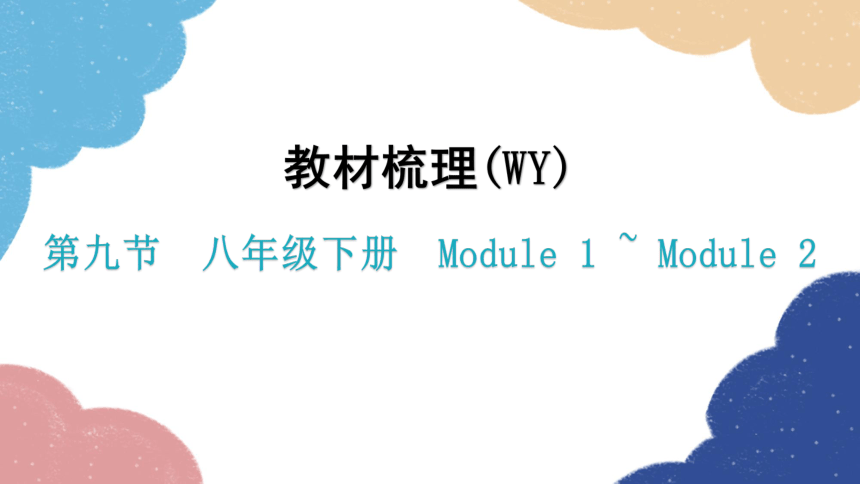 | |
| 格式 | pptx | ||
| 文件大小 | 522.4KB | ||
| 资源类型 | 教案 | ||
| 版本资源 | 外研版 | ||
| 科目 | 英语 | ||
| 更新时间 | 2023-06-08 11:14:39 | ||
图片预览

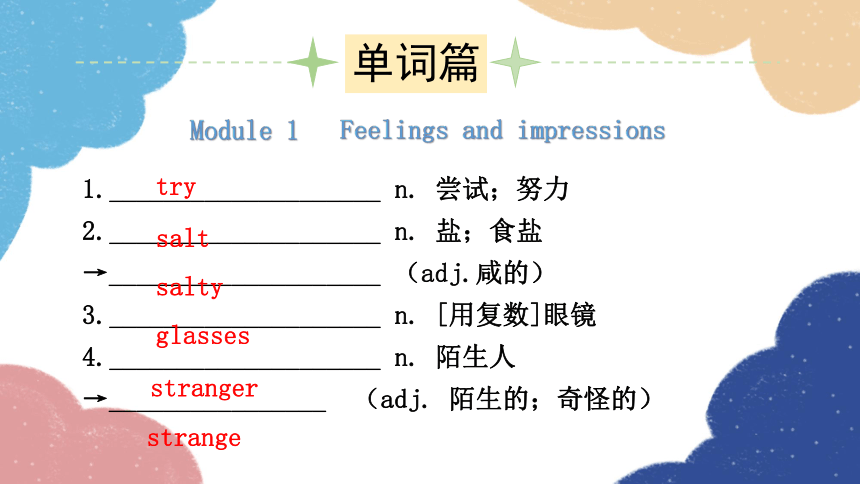
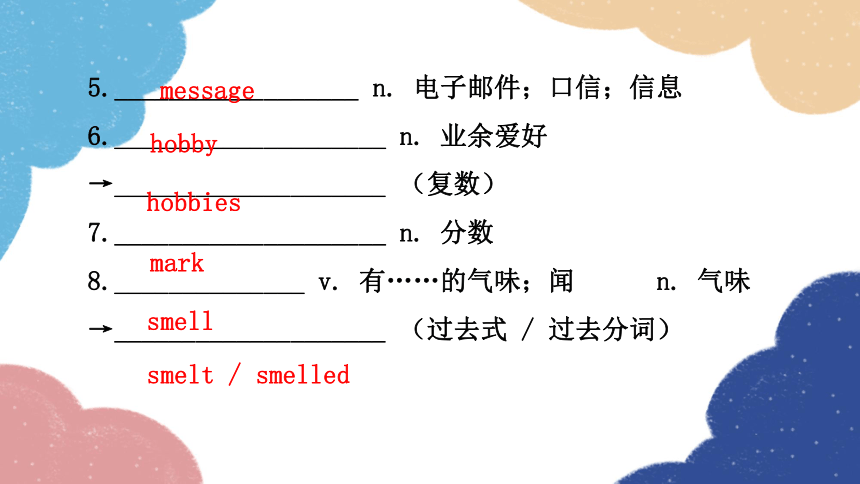
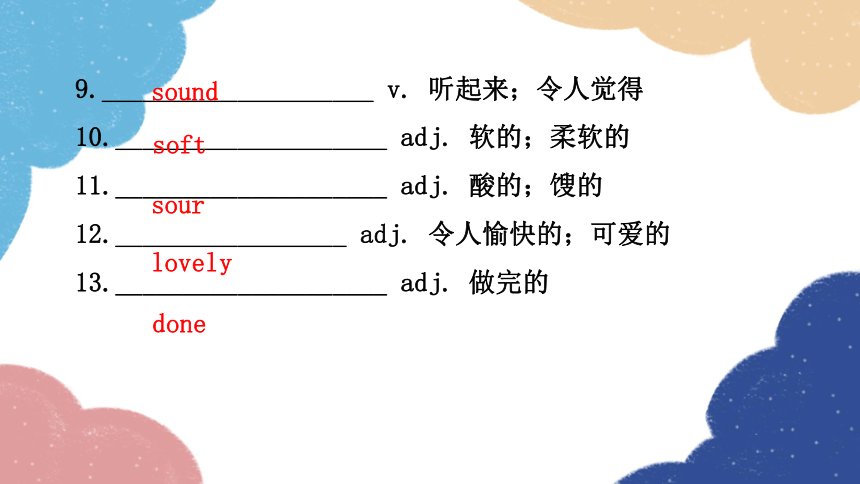
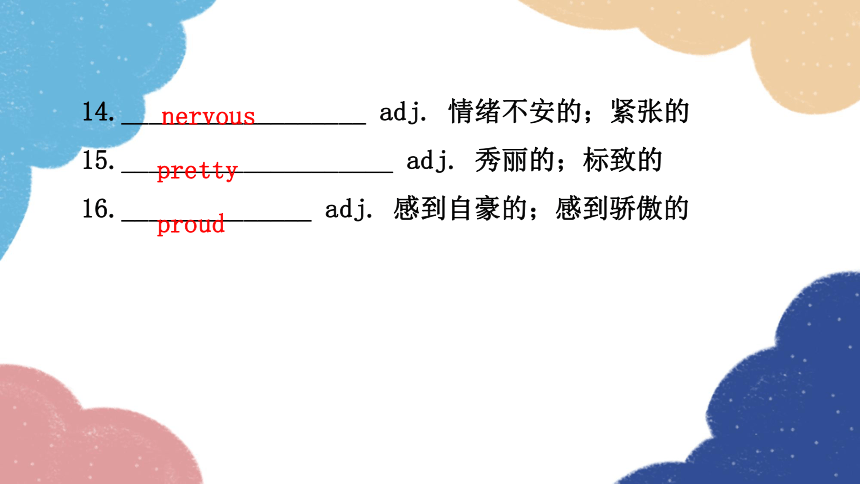
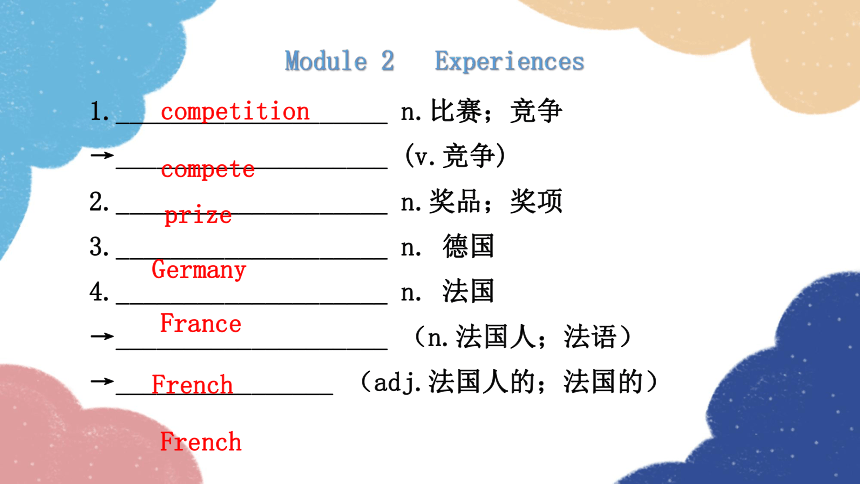
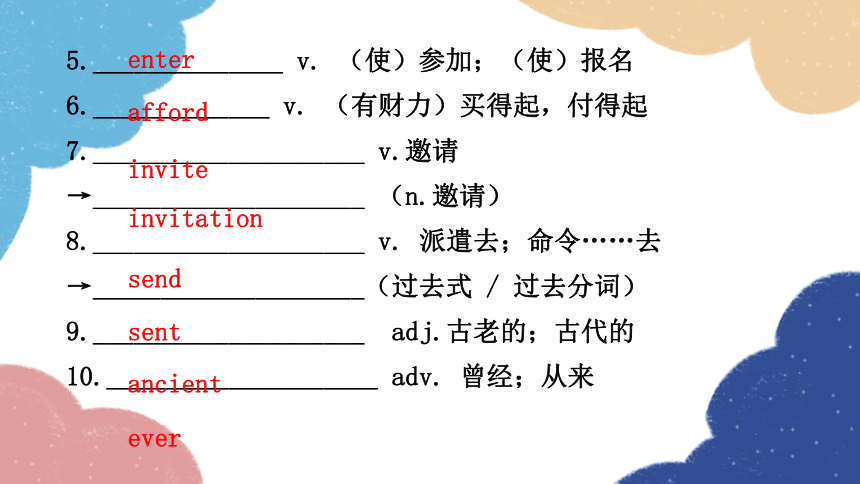
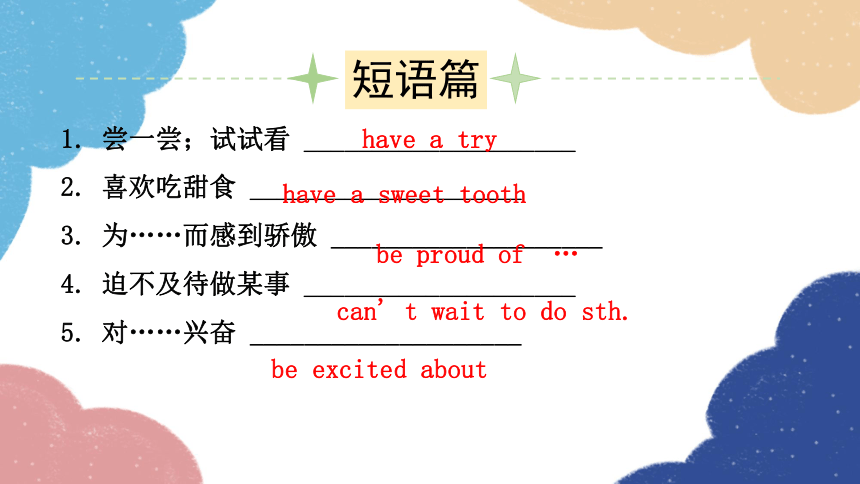
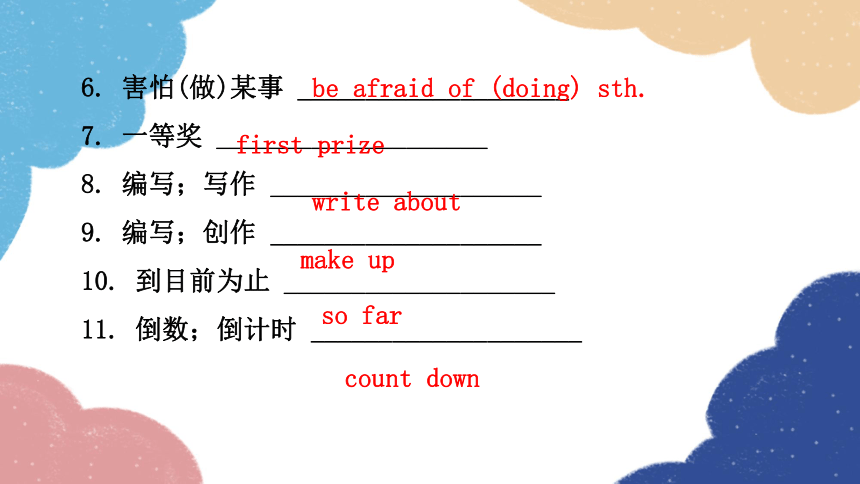
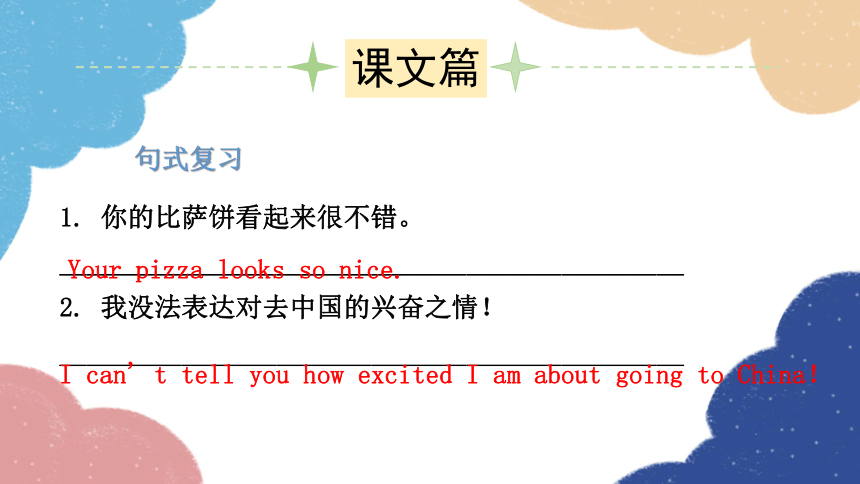
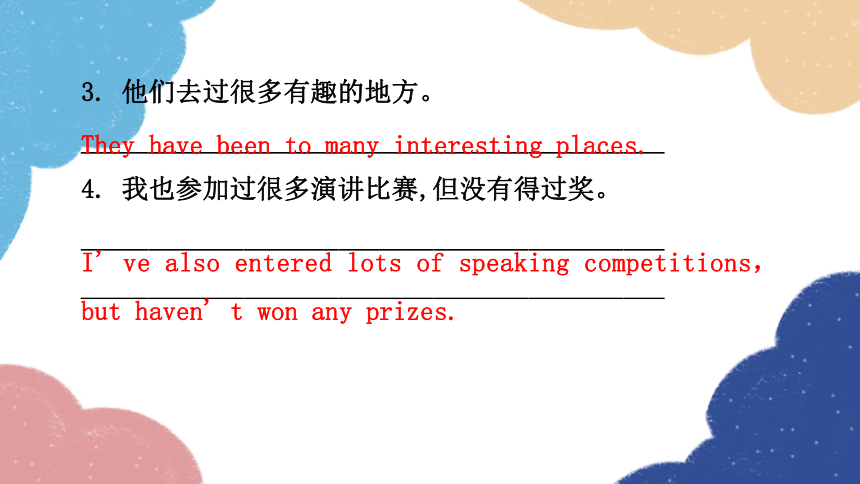
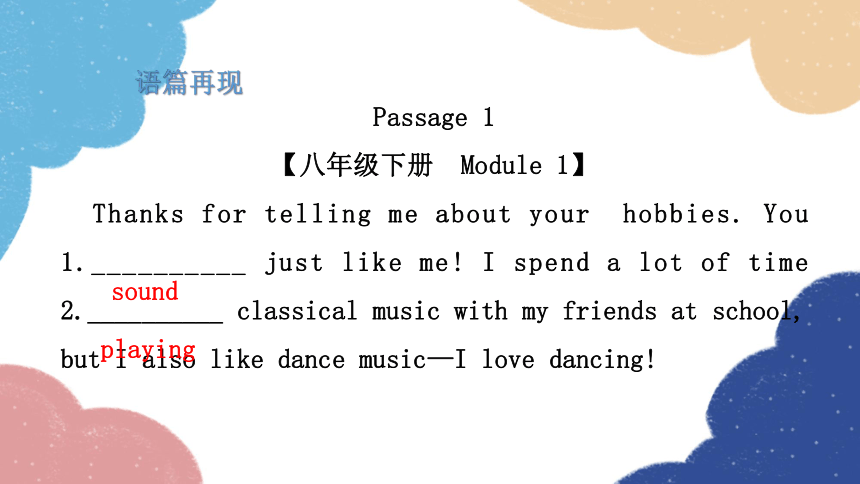
文档简介
(共55张PPT)
教材梳理(WY)
第九节 八年级下册 Module 1 ~ Module 2
Module 1 Feelings and impressions
单词篇
1.____________________ n. 尝试;努力
2.____________________ n. 盐;食盐
→____________________ (adj.咸的)
3.____________________ n. [用复数]眼镜
4.____________________ n. 陌生人
→________________ (adj. 陌生的;奇怪的)
try
salt
salty
glasses
stranger
strange
5.__________________ n. 电子邮件;口信;信息
6.____________________ n. 业余爱好
→____________________ (复数)
7.____________________ n. 分数
8.______________ v. 有……的气味;闻 n. 气味
→____________________ (过去式 / 过去分词)
message
hobby
hobbies
mark
smell
smelt / smelled
9.____________________ v. 听起来;令人觉得
10.____________________ adj. 软的;柔软的
11.____________________ adj. 酸的;馊的
12._________________ adj. 令人愉快的;可爱的
13.____________________ adj. 做完的
sound
soft
sour
lovely
done
14.__________________ adj. 情绪不安的;紧张的
15.____________________ adj. 秀丽的;标致的
16.______________ adj. 感到自豪的;感到骄傲的
nervous
pretty
proud
Module 2 Experiences
1.____________________ n.比赛;竞争
→____________________ (v.竞争)
2.____________________ n.奖品;奖项
3.____________________ n. 德国
4.____________________ n. 法国
→____________________ (n.法国人;法语)
→________________ (adj.法国人的;法国的)
competition
compete
prize
Germany
France
French
French
5.______________ v. (使)参加;(使)报名
6._____________ v. (有财力)买得起,付得起
7.____________________ v.邀请
→____________________ (n.邀请)
8.____________________ v. 派遣去;命令……去
→____________________(过去式 / 过去分词)
9.____________________ adj.古老的;古代的
10.____________________ adv. 曾经;从来
enter
afford
invite
invitation
send
sent
ancient
ever
短语篇
1. 尝一尝;试试看 ____________________
2. 喜欢吃甜食 ____________________
3. 为……而感到骄傲 ____________________
4. 迫不及待做某事 ____________________
5. 对……兴奋 ____________________
have a try
have a sweet tooth
be proud of …
can' t wait to do sth.
be excited about
6. 害怕(做)某事 ____________________
7. 一等奖 ____________________
8. 编写;写作 ____________________
9. 编写;创作 ____________________
10. 到目前为止 ____________________
11. 倒数;倒计时 ____________________
be afraid of (doing) sth.
first prize
write about
make up
so far
count down
课文篇
句式复习
1. 你的比萨饼看起来很不错。
______________________________________________
2. 我没法表达对去中国的兴奋之情!
______________________________________________
Your pizza looks so nice.
I can' t tell you how excited I am about going to China!
3. 他们去过很多有趣的地方。
___________________________________________
4. 我也参加过很多演讲比赛,但没有得过奖。
___________________________________________
___________________________________________
They have been to many interesting places.
I' ve also entered lots of speaking competitions,but haven' t won any prizes.
语篇再现
Passage 1
【八年级下册 Module 1】
Thanks for telling me about your hobbies. You 1.__________ just like me! I spend a lot of time 2.__________ classical music with my friends at school, but I also like dance music—I love dancing!
sound
playing
I enjoy sports as well, especially tennis. My brother is in the school tennis team—I' m very 3.__________ of him! He' s good at everything, but I' m not. Sometimes I get bad marks at school, and I feel sad. I should work harder.
proud
You asked me,“How do you 4.__________ about coming to China ” Well, I often feel a bit sad at first when I leave my mum and dad for a few days, and I' m quite shy when I' m with 5.__________. I feel nervous when I speak Chinese, but I' ll be fine 6.______ a few days. I' m always sorry when I don' t know how to do things in the right way, so please help me when I' m with you in China! Oh, I' m afraid of flying too. But I can' t tell you how 7.__________ I am about going to China!
feel
strangers
in
excited
Passage 2
【八年级下册 Module 2】
The Robinsons love seeing the world. They have 1.__________ to many interesting places. For example, in Egypt, they have seen the Pyramids, travelled on a boat on the Nile River, and visited the palaces and towers of 2.__________ kings and queens.
been
ancient
Mike and Clare have also 3.__________ to learn the language of the country, Arabic. This language is different from English in many 4.__________, and they find it hard to spell and pronounce the words. However, they still enjoy learning it. So 5.__________ they have learnt to speak German, French, Chinese and Arabic. Sometimes they 6.__________ the languages. “It' s really fun,” said Clare.
begun
ways
far
mix
考点篇
( )1.Betty is learning to sing an English song and it ___________ very beautiful.
A.feels B.tastes C.sounds
考点1
表示感觉和知觉的系动词【八年级下册Module 1】
专练
C
( )2.Look at the bed. It ___________ soft and comfortable.
A.smells B.tastes C.feels
( )3.Joe ___________ happy, because he has lost his book.
A.looks B.doesn' t look C.looks not
C
B
点拨
感官动词后接形容词,常见的感官动词有:look(看起来),feel(感觉;摸起来),smell(闻起来),sound(听起来),taste(尝起来)。(详解见主书第一部分[第二节 动词])
考点2
现在完成时(1)【八年级下册 Module 2】
The presenter(主持人)says, “Boys and girls, last week we held a writing competition, and seven hundred and eighty-five students entered it. The one who gets the top mark will be the winner. And the winner will win a trip to Hong Kong Disneyland Resort. We ____1____ marks to you, and here' s
专练
have given
the result. The winner goes to Xie Mei. Congratulations! You ____2____ the competition.” Xie Mei is really happy. She has never ____3____ this would come true.
have won
thought
( )1.A.have given B.are giving C.will give
( )2.A.have won B.will win C.are winning
( )3.A.think B.thinks C.thought
A
A
C
点拨
现在完成时的句型结构:(1)肯定句:主语+have / has+动词的过去分词+其他. (2)否定句:主语+have / has not+动词的过去分词+其他. (3)一般疑问句:Have / Has+主语+动词的过去分词+其他? 肯定回答:Yes, 主语+have / has. 否定回答:No, 主语+haven' t / hasn' t. (详解见主书第一部分[第十节 谓语动词的时态])
考点3
stop doing sth.和stop to do sth.的区别【八年级下册 Module 2】
1. The students stopped ___________ (talk)when the teacher came in.
2. Tell him not to stop __________ (rest). The work should be done right away.
专练
根据句意,用所给单词的适当形式填空
talking
to rest
点拨
比较项 含义及用法
stop doing sth. 意为“停止做某事”,指停止正在做的事
stop to do sth. 意为“停下来去做某事”,指停止正在做的事,去做另一件事。to do作stop的目的状语,是要开始做的事情
考点4
“one of+形容词的最高级+可数名词复数”的用法【八年级下册 Module 2】
1. This box is one of the __________ (heavy)box in the room.
2. One of the oldest houses in this village __________ (have)been burnt in a fire. The villagers are sad.
3. New York is one of the biggest __________(city)in America.
专练
根据句意,用所给单词的适当形式填空
heaviest
has
cities
点拨
“one of+形容词的最高级+可数名词复数”意为“……(中)最……之一”,one of后接可数名词复数或复数代词的宾格形式。在句中作主语时,谓语动词用第三人称单数形式。
考点5
have gone to, have been to和have been in的区别【八年级下册 Module 2】
( )1.Sanya is a beautiful city. I __________ there twice.
A.have gone B.have been C.have been to
专练
B
( )2.—May I speak to Ann
—Sorry,she isn' t in. She __________ France.
A.has gone to B.has been to C.was going to
( )3.Julie' s father __________London for a month.
A.has gone to B.has been to C.has been in
A
C
点拨
比较项 含义及用法
have gone to 表示“已去某地(未回)”,强调说话人不在现场
have been to 表示“曾去过某地(已回)”,侧重指经历,后面一般接次数
have been in 表示“已经在某地(待了一段时间)”,常与表示一段时间的状语连用
演练篇
一、完形填空
I sat down to read under an old tree in the park. I felt my life was ____1____, for my whole world was dark. A young boy ran up to me, out of ____2____. He stood right before me with his head down and said ____3____, “Look what I have found!” I gave him a small smile and then turned my eyes away so that he could take his dry flower and ____4____.
hopeless
breath
excitedly
go away
However, he sat next to me and placed the flower to his nose and said in surprise, “It ____5____ sweet and it' s beautiful too. That' s why I picked it. Here, it' s for you.” The flower before me was dead. But I knew I must ____6____ it, or he might never leave. So I accepted the flower and replied, “This is just what I want.” Just then,for the first time I noticed that the boy could not see, because he was ____7____.
smells
accept
blind
Tears came down my ____8____ as I thanked him for picking the best one. “You' re welcome,” he smiled,and then ran off to play. Through the eyes of the boy, I could see the problem was not with the world; the problem was me. I decided to see the beauty in life, and ____9____ every second of my life. And then I held that ____10____ flower up to my nose and breathed in the smell of a beautiful rose.
face
enjoy
dry
( )1. A. hopeless B. colourful
C. simple D. wonderful
( )2. A. mind B. trouble C. breath D. work
( )3. A. sadly B. strictly C. angrily D. excitedly
( )4. A. go away B. go by C. go through D. go over
( )5. A. tastes B. sounds C. smells D. looks
A
C
D
A
C
( )6. A. buy B. sell C. accept D. break
( )7. A. homeless B. lonely C. blind D. deaf
( )8. A. head B. mouth C. nose D. face
( )9. A. waste B. enjoy C. miss D. forget
( )10. A. fresh B. ugly C. dry D. wet
C
C
D
B
C
二、阅读理解(B篇)
Learning to laugh at yourself is one of the biggest differences between happy people and depressed(沮丧的) people. If you can turn hard moments, mistakes, and shortcomings as chances for a good laugh at yourself, those things will affect(影响) you less and you will become a happy person.
Everyone possibly makes a mistake sometimes, and it doesn' t have to define(界定) you as a person. Laughing at yourself can tell you and the people around you that making mistakes is okay.
Don' t worry about the sound of your laugh. Everyone' s laugh is different, if yours is polite and it comes from reasonable joy, you don' t need to worry about having an “ugly” laugh.
If you' re worried about laughing and often worried about what people will think of you, it' s hard to really have fun. If you' re with the kind of friends who make fun of someone for laughing, you should abandon these friends. Try to find some new friends.
Take your time. Even a busy person should learn to spare time for himself and spend time just staying alone. Doing these will help you relax and keep you calm and ready to laugh.
Make sure you do something you enjoy each day. Relax by playing a record and smiling at yourself, having your favourite drink.
Try to add 15 minutes to your day to do something like watching a comedy or looking at humorous photos online. Try to put this in your timetable right after the most stressful part of your day if you can. Finally, you will be a person whose life is full of laughs.
( )11. What can laughing at yourself do
A. Make you depressed.
B. Make a few mistakes.
C. Make you different from others.
D. Make you a happy person.
D
( )12. How can people know making mistakes is okay
A. By laughing at themselves.
B. By worrying about the sound of laughs.
C. By having reasonable joy.
D. By having an ugly laugh.
A
( )13. What does the underlined word “abandon” in Paragraph 4 mean
A. Choose. B. Improve.
C. Respect. D. Leave.
D
( )14. According to the passage, which of the following is TRUE
A. Everyone should have an ugly laugh.
B. People' s laughs can' t be different from each other' s.
C. Smiling at themselves can make people enjoy the day.
D. People can do everything they like to be happy.
C
( )15. 2022新考法:段落大意题What are the last three paragraphs mainly about
A. How to make your life fill with laughs.
B. How to laugh at yourself.
C. How to make new friends.
D. How to have a beautiful smile.
A
三、回答问题
Working as a part-time assistant in a shop is a way for young people to earn some extra money. For me, it is more than twenty dollars per hour.
Like other eighteen-year-old girls, I chose to work in a clothing shop. On the first day, I was trained to fold and organize clothes. The work didn' t seem easy
to me because everything had to be done in an accurate(精确的)way. I felt a little impatient because I couldn' t get it right at first. The manager told me not to be impatient and taught me skills on how to finish the work well. After hundreds of tries, I had the clothes folded perfectly. Through this experience, I' ve learnt patience can help me in the work.
About three weeks ago, I helped an old lady who was looking for a special dress. She told me exactly what she was picturing—a blue dress with long sleeves and a lace neck. We didn' t have any such dress, and when I explained that to her, she wasn' t very happy. Instead of getting impatient, I tried getting to learn about her interest first. We shared
our love of the fashion show. I also asked her what the dress was for. Everything I did worked. She found other items she liked and finally bought some new blouses and jeans worth of $300. This experience has taught me how to meet customers' needs.
I' ve experienced frustrations(挫折) and challenges in the work. To do well, I must learn to deal with them. The work experience changed me a lot and helped me in other aspects of my life as well.
16.How old was the writer when she worked in a clothing shop
______________________________________________________________________________________
17.Why did the writer think the work was difficult
______________________________________________________________________________________
The writer / She was 18 (years old). / 18 (years old).
Because everything had to be done in an accurate way.
18.Who gave the writer a hand and taught her how to finish the work well
______________________________________________________________________________________
19.What was the old lady looking for at first
______________________________________________________________________________________
The manager gave the writer a hand and taught her how to finish the work well. / The manager.
The old lady / She was looking for a special dress at first. / A special dress.
20.What must the writer do if she wants to do well in the work according to the last paragraph
______________________________________________________________________________________
The writer / She must learn to deal with frustrations and challenges in the work.
THANKS!
教材梳理(WY)
第九节 八年级下册 Module 1 ~ Module 2
Module 1 Feelings and impressions
单词篇
1.____________________ n. 尝试;努力
2.____________________ n. 盐;食盐
→____________________ (adj.咸的)
3.____________________ n. [用复数]眼镜
4.____________________ n. 陌生人
→________________ (adj. 陌生的;奇怪的)
try
salt
salty
glasses
stranger
strange
5.__________________ n. 电子邮件;口信;信息
6.____________________ n. 业余爱好
→____________________ (复数)
7.____________________ n. 分数
8.______________ v. 有……的气味;闻 n. 气味
→____________________ (过去式 / 过去分词)
message
hobby
hobbies
mark
smell
smelt / smelled
9.____________________ v. 听起来;令人觉得
10.____________________ adj. 软的;柔软的
11.____________________ adj. 酸的;馊的
12._________________ adj. 令人愉快的;可爱的
13.____________________ adj. 做完的
sound
soft
sour
lovely
done
14.__________________ adj. 情绪不安的;紧张的
15.____________________ adj. 秀丽的;标致的
16.______________ adj. 感到自豪的;感到骄傲的
nervous
pretty
proud
Module 2 Experiences
1.____________________ n.比赛;竞争
→____________________ (v.竞争)
2.____________________ n.奖品;奖项
3.____________________ n. 德国
4.____________________ n. 法国
→____________________ (n.法国人;法语)
→________________ (adj.法国人的;法国的)
competition
compete
prize
Germany
France
French
French
5.______________ v. (使)参加;(使)报名
6._____________ v. (有财力)买得起,付得起
7.____________________ v.邀请
→____________________ (n.邀请)
8.____________________ v. 派遣去;命令……去
→____________________(过去式 / 过去分词)
9.____________________ adj.古老的;古代的
10.____________________ adv. 曾经;从来
enter
afford
invite
invitation
send
sent
ancient
ever
短语篇
1. 尝一尝;试试看 ____________________
2. 喜欢吃甜食 ____________________
3. 为……而感到骄傲 ____________________
4. 迫不及待做某事 ____________________
5. 对……兴奋 ____________________
have a try
have a sweet tooth
be proud of …
can' t wait to do sth.
be excited about
6. 害怕(做)某事 ____________________
7. 一等奖 ____________________
8. 编写;写作 ____________________
9. 编写;创作 ____________________
10. 到目前为止 ____________________
11. 倒数;倒计时 ____________________
be afraid of (doing) sth.
first prize
write about
make up
so far
count down
课文篇
句式复习
1. 你的比萨饼看起来很不错。
______________________________________________
2. 我没法表达对去中国的兴奋之情!
______________________________________________
Your pizza looks so nice.
I can' t tell you how excited I am about going to China!
3. 他们去过很多有趣的地方。
___________________________________________
4. 我也参加过很多演讲比赛,但没有得过奖。
___________________________________________
___________________________________________
They have been to many interesting places.
I' ve also entered lots of speaking competitions,but haven' t won any prizes.
语篇再现
Passage 1
【八年级下册 Module 1】
Thanks for telling me about your hobbies. You 1.__________ just like me! I spend a lot of time 2.__________ classical music with my friends at school, but I also like dance music—I love dancing!
sound
playing
I enjoy sports as well, especially tennis. My brother is in the school tennis team—I' m very 3.__________ of him! He' s good at everything, but I' m not. Sometimes I get bad marks at school, and I feel sad. I should work harder.
proud
You asked me,“How do you 4.__________ about coming to China ” Well, I often feel a bit sad at first when I leave my mum and dad for a few days, and I' m quite shy when I' m with 5.__________. I feel nervous when I speak Chinese, but I' ll be fine 6.______ a few days. I' m always sorry when I don' t know how to do things in the right way, so please help me when I' m with you in China! Oh, I' m afraid of flying too. But I can' t tell you how 7.__________ I am about going to China!
feel
strangers
in
excited
Passage 2
【八年级下册 Module 2】
The Robinsons love seeing the world. They have 1.__________ to many interesting places. For example, in Egypt, they have seen the Pyramids, travelled on a boat on the Nile River, and visited the palaces and towers of 2.__________ kings and queens.
been
ancient
Mike and Clare have also 3.__________ to learn the language of the country, Arabic. This language is different from English in many 4.__________, and they find it hard to spell and pronounce the words. However, they still enjoy learning it. So 5.__________ they have learnt to speak German, French, Chinese and Arabic. Sometimes they 6.__________ the languages. “It' s really fun,” said Clare.
begun
ways
far
mix
考点篇
( )1.Betty is learning to sing an English song and it ___________ very beautiful.
A.feels B.tastes C.sounds
考点1
表示感觉和知觉的系动词【八年级下册Module 1】
专练
C
( )2.Look at the bed. It ___________ soft and comfortable.
A.smells B.tastes C.feels
( )3.Joe ___________ happy, because he has lost his book.
A.looks B.doesn' t look C.looks not
C
B
点拨
感官动词后接形容词,常见的感官动词有:look(看起来),feel(感觉;摸起来),smell(闻起来),sound(听起来),taste(尝起来)。(详解见主书第一部分[第二节 动词])
考点2
现在完成时(1)【八年级下册 Module 2】
The presenter(主持人)says, “Boys and girls, last week we held a writing competition, and seven hundred and eighty-five students entered it. The one who gets the top mark will be the winner. And the winner will win a trip to Hong Kong Disneyland Resort. We ____1____ marks to you, and here' s
专练
have given
the result. The winner goes to Xie Mei. Congratulations! You ____2____ the competition.” Xie Mei is really happy. She has never ____3____ this would come true.
have won
thought
( )1.A.have given B.are giving C.will give
( )2.A.have won B.will win C.are winning
( )3.A.think B.thinks C.thought
A
A
C
点拨
现在完成时的句型结构:(1)肯定句:主语+have / has+动词的过去分词+其他. (2)否定句:主语+have / has not+动词的过去分词+其他. (3)一般疑问句:Have / Has+主语+动词的过去分词+其他? 肯定回答:Yes, 主语+have / has. 否定回答:No, 主语+haven' t / hasn' t. (详解见主书第一部分[第十节 谓语动词的时态])
考点3
stop doing sth.和stop to do sth.的区别【八年级下册 Module 2】
1. The students stopped ___________ (talk)when the teacher came in.
2. Tell him not to stop __________ (rest). The work should be done right away.
专练
根据句意,用所给单词的适当形式填空
talking
to rest
点拨
比较项 含义及用法
stop doing sth. 意为“停止做某事”,指停止正在做的事
stop to do sth. 意为“停下来去做某事”,指停止正在做的事,去做另一件事。to do作stop的目的状语,是要开始做的事情
考点4
“one of+形容词的最高级+可数名词复数”的用法【八年级下册 Module 2】
1. This box is one of the __________ (heavy)box in the room.
2. One of the oldest houses in this village __________ (have)been burnt in a fire. The villagers are sad.
3. New York is one of the biggest __________(city)in America.
专练
根据句意,用所给单词的适当形式填空
heaviest
has
cities
点拨
“one of+形容词的最高级+可数名词复数”意为“……(中)最……之一”,one of后接可数名词复数或复数代词的宾格形式。在句中作主语时,谓语动词用第三人称单数形式。
考点5
have gone to, have been to和have been in的区别【八年级下册 Module 2】
( )1.Sanya is a beautiful city. I __________ there twice.
A.have gone B.have been C.have been to
专练
B
( )2.—May I speak to Ann
—Sorry,she isn' t in. She __________ France.
A.has gone to B.has been to C.was going to
( )3.Julie' s father __________London for a month.
A.has gone to B.has been to C.has been in
A
C
点拨
比较项 含义及用法
have gone to 表示“已去某地(未回)”,强调说话人不在现场
have been to 表示“曾去过某地(已回)”,侧重指经历,后面一般接次数
have been in 表示“已经在某地(待了一段时间)”,常与表示一段时间的状语连用
演练篇
一、完形填空
I sat down to read under an old tree in the park. I felt my life was ____1____, for my whole world was dark. A young boy ran up to me, out of ____2____. He stood right before me with his head down and said ____3____, “Look what I have found!” I gave him a small smile and then turned my eyes away so that he could take his dry flower and ____4____.
hopeless
breath
excitedly
go away
However, he sat next to me and placed the flower to his nose and said in surprise, “It ____5____ sweet and it' s beautiful too. That' s why I picked it. Here, it' s for you.” The flower before me was dead. But I knew I must ____6____ it, or he might never leave. So I accepted the flower and replied, “This is just what I want.” Just then,for the first time I noticed that the boy could not see, because he was ____7____.
smells
accept
blind
Tears came down my ____8____ as I thanked him for picking the best one. “You' re welcome,” he smiled,and then ran off to play. Through the eyes of the boy, I could see the problem was not with the world; the problem was me. I decided to see the beauty in life, and ____9____ every second of my life. And then I held that ____10____ flower up to my nose and breathed in the smell of a beautiful rose.
face
enjoy
dry
( )1. A. hopeless B. colourful
C. simple D. wonderful
( )2. A. mind B. trouble C. breath D. work
( )3. A. sadly B. strictly C. angrily D. excitedly
( )4. A. go away B. go by C. go through D. go over
( )5. A. tastes B. sounds C. smells D. looks
A
C
D
A
C
( )6. A. buy B. sell C. accept D. break
( )7. A. homeless B. lonely C. blind D. deaf
( )8. A. head B. mouth C. nose D. face
( )9. A. waste B. enjoy C. miss D. forget
( )10. A. fresh B. ugly C. dry D. wet
C
C
D
B
C
二、阅读理解(B篇)
Learning to laugh at yourself is one of the biggest differences between happy people and depressed(沮丧的) people. If you can turn hard moments, mistakes, and shortcomings as chances for a good laugh at yourself, those things will affect(影响) you less and you will become a happy person.
Everyone possibly makes a mistake sometimes, and it doesn' t have to define(界定) you as a person. Laughing at yourself can tell you and the people around you that making mistakes is okay.
Don' t worry about the sound of your laugh. Everyone' s laugh is different, if yours is polite and it comes from reasonable joy, you don' t need to worry about having an “ugly” laugh.
If you' re worried about laughing and often worried about what people will think of you, it' s hard to really have fun. If you' re with the kind of friends who make fun of someone for laughing, you should abandon these friends. Try to find some new friends.
Take your time. Even a busy person should learn to spare time for himself and spend time just staying alone. Doing these will help you relax and keep you calm and ready to laugh.
Make sure you do something you enjoy each day. Relax by playing a record and smiling at yourself, having your favourite drink.
Try to add 15 minutes to your day to do something like watching a comedy or looking at humorous photos online. Try to put this in your timetable right after the most stressful part of your day if you can. Finally, you will be a person whose life is full of laughs.
( )11. What can laughing at yourself do
A. Make you depressed.
B. Make a few mistakes.
C. Make you different from others.
D. Make you a happy person.
D
( )12. How can people know making mistakes is okay
A. By laughing at themselves.
B. By worrying about the sound of laughs.
C. By having reasonable joy.
D. By having an ugly laugh.
A
( )13. What does the underlined word “abandon” in Paragraph 4 mean
A. Choose. B. Improve.
C. Respect. D. Leave.
D
( )14. According to the passage, which of the following is TRUE
A. Everyone should have an ugly laugh.
B. People' s laughs can' t be different from each other' s.
C. Smiling at themselves can make people enjoy the day.
D. People can do everything they like to be happy.
C
( )15. 2022新考法:段落大意题What are the last three paragraphs mainly about
A. How to make your life fill with laughs.
B. How to laugh at yourself.
C. How to make new friends.
D. How to have a beautiful smile.
A
三、回答问题
Working as a part-time assistant in a shop is a way for young people to earn some extra money. For me, it is more than twenty dollars per hour.
Like other eighteen-year-old girls, I chose to work in a clothing shop. On the first day, I was trained to fold and organize clothes. The work didn' t seem easy
to me because everything had to be done in an accurate(精确的)way. I felt a little impatient because I couldn' t get it right at first. The manager told me not to be impatient and taught me skills on how to finish the work well. After hundreds of tries, I had the clothes folded perfectly. Through this experience, I' ve learnt patience can help me in the work.
About three weeks ago, I helped an old lady who was looking for a special dress. She told me exactly what she was picturing—a blue dress with long sleeves and a lace neck. We didn' t have any such dress, and when I explained that to her, she wasn' t very happy. Instead of getting impatient, I tried getting to learn about her interest first. We shared
our love of the fashion show. I also asked her what the dress was for. Everything I did worked. She found other items she liked and finally bought some new blouses and jeans worth of $300. This experience has taught me how to meet customers' needs.
I' ve experienced frustrations(挫折) and challenges in the work. To do well, I must learn to deal with them. The work experience changed me a lot and helped me in other aspects of my life as well.
16.How old was the writer when she worked in a clothing shop
______________________________________________________________________________________
17.Why did the writer think the work was difficult
______________________________________________________________________________________
The writer / She was 18 (years old). / 18 (years old).
Because everything had to be done in an accurate way.
18.Who gave the writer a hand and taught her how to finish the work well
______________________________________________________________________________________
19.What was the old lady looking for at first
______________________________________________________________________________________
The manager gave the writer a hand and taught her how to finish the work well. / The manager.
The old lady / She was looking for a special dress at first. / A special dress.
20.What must the writer do if she wants to do well in the work according to the last paragraph
______________________________________________________________________________________
The writer / She must learn to deal with frustrations and challenges in the work.
THANKS!
